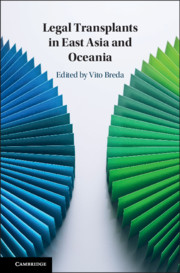Book contents
- Legal Transplants in East Asia and Oceania
- Legal Transplants in East Asia and Oceania
- Copyright page
- Dedication
- Contents
- Figures
- Tables
- Contributors
- Acknowledgements
- Table of Cases
- Table of Statutes
- Abbreviations
- Introduction
- Part I
- 1 The Legal Transplants Debate: Getting Beyond the Impasse?
- 2 Transplant Shock: the Hazards of Introducing Statutes of General Application
- 3 Bentham’s Theory of Legal Transplants and His Influence in Japan
- 4 On the Hardingian Renovation of Legal Transplants
- Part II
- Part III
- Index
- References
3 - Bentham’s Theory of Legal Transplants and His Influence in Japan
from Part I
Published online by Cambridge University Press: 18 June 2019
- Legal Transplants in East Asia and Oceania
- Legal Transplants in East Asia and Oceania
- Copyright page
- Dedication
- Contents
- Figures
- Tables
- Contributors
- Acknowledgements
- Table of Cases
- Table of Statutes
- Abbreviations
- Introduction
- Part I
- 1 The Legal Transplants Debate: Getting Beyond the Impasse?
- 2 Transplant Shock: the Hazards of Introducing Statutes of General Application
- 3 Bentham’s Theory of Legal Transplants and His Influence in Japan
- 4 On the Hardingian Renovation of Legal Transplants
- Part II
- Part III
- Index
- References
Summary
Jeremy Bentham (1748–1832) is known as a pioneer of utilitarianism and legal positivism. It is less well known, however, that he aspired to be ‘the legislator of the world’. He sought to invent complete codes of laws, known as ‘Pannomion’, which mainly comprised the Constitutional Code, the Civil Code the Criminal Code and the Procedure Codes based on the principle of utility. Bentham also argued that, as human beings are sufficiently similar, his Pannomion, based on the ‘abstract utility’ induced by empirical generalizations about human psychology, could be introduced universally. He proposed that the United States, Russia, Spain, Portugal, Greece, and the countries in Latin America should adopt his Pannomion.
Bentham developed a theory of legal transplants in his article ‘Place and Time’ (written around 1780). Bentham was well aware that the natives would refuse his Pannomion due to their prejudicial biases or sensibilities.
- Type
- Chapter
- Information
- Legal Transplants in East Asia and Oceania , pp. 63 - 83Publisher: Cambridge University PressPrint publication year: 2019



